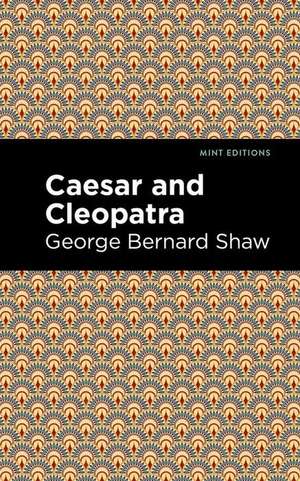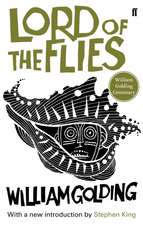Caesar and Cleopatra: Mint Editions
Autor George Bernard Shawen Limba Engleză Hardback – 8 dec 2020
| Toate formatele și edițiile | Preț | Express |
|---|---|---|
| Paperback (9) | 34.17 lei 3-5 săpt. | +5.19 lei 6-12 zile |
| Mint Editions – dec 2020 | 34.17 lei 3-5 săpt. | +5.19 lei 6-12 zile |
| CREATESPACE – | 42.34 lei 3-5 săpt. | |
| – | 67.91 lei 3-5 săpt. | |
| CREATESPACE – | 70.82 lei 3-5 săpt. | |
| CREATESPACE – | 71.60 lei 3-5 săpt. | |
| CREATESPACE – | 75.08 lei 3-5 săpt. | |
| 1st World Publishing – 9 noi 2013 | 77.70 lei 6-8 săpt. | |
| Indoeuropeanpublishing.com – 16 iul 2019 | 99.05 lei 6-8 săpt. | |
| Sovereign – 19 aug 2018 | 126.64 lei 6-8 săpt. | |
| Hardback (3) | 63.27 lei 3-5 săpt. | |
| Mint Editions – 8 dec 2020 | 63.27 lei 3-5 săpt. | |
| 1st World Publishing – 9 noi 2013 | 174.28 lei 6-8 săpt. | |
| Indoeuropeanpublishing.com – 15 iul 2019 | 182.53 lei 6-8 săpt. |
Din seria Mint Editions
-
 Preț: 32.32 lei
Preț: 32.32 lei -
 Preț: 111.03 lei
Preț: 111.03 lei -
 Preț: 81.23 lei
Preț: 81.23 lei -
 Preț: 92.53 lei
Preț: 92.53 lei -
 Preț: 56.26 lei
Preț: 56.26 lei -
 Preț: 43.90 lei
Preț: 43.90 lei -
 Preț: 153.79 lei
Preț: 153.79 lei -
 Preț: 62.64 lei
Preț: 62.64 lei -
 Preț: 27.00 lei
Preț: 27.00 lei -
 Preț: 299.10 lei
Preț: 299.10 lei -
 Preț: 177.54 lei
Preț: 177.54 lei -
 Preț: 74.19 lei
Preț: 74.19 lei -
 Preț: 146.59 lei
Preț: 146.59 lei -
 Preț: 62.45 lei
Preț: 62.45 lei -
 Preț: 210.27 lei
Preț: 210.27 lei -
 Preț: 117.10 lei
Preț: 117.10 lei -
 Preț: 85.73 lei
Preț: 85.73 lei -
 Preț: 50.05 lei
Preț: 50.05 lei -
 Preț: 161.22 lei
Preț: 161.22 lei -
 Preț: 68.66 lei
Preț: 68.66 lei -
 Preț: 99.14 lei
Preț: 99.14 lei -
 Preț: 68.21 lei
Preț: 68.21 lei -
 Preț: 54.63 lei
Preț: 54.63 lei -
 Preț: 41.11 lei
Preț: 41.11 lei -
 Preț: 237.11 lei
Preț: 237.11 lei -
 Preț: 103.89 lei
Preț: 103.89 lei -
 Preț: 49.88 lei
Preț: 49.88 lei -
 Preț: 55.61 lei
Preț: 55.61 lei -
 Preț: 116.88 lei
Preț: 116.88 lei -
 Preț: 32.32 lei
Preț: 32.32 lei -
 Preț: 38.70 lei
Preț: 38.70 lei -
 Preț: 69.30 lei
Preț: 69.30 lei -
 Preț: 49.88 lei
Preț: 49.88 lei -
 Preț: 25.53 lei
Preț: 25.53 lei -
 Preț: 32.76 lei
Preț: 32.76 lei -
 Preț: 66.16 lei
Preț: 66.16 lei -
 Preț: 56.67 lei
Preț: 56.67 lei -
 Preț: 55.20 lei
Preț: 55.20 lei -
 Preț: 43.90 lei
Preț: 43.90 lei -
 Preț: 75.01 lei
Preț: 75.01 lei -
 Preț: 37.88 lei
Preț: 37.88 lei -
 Preț: 43.04 lei
Preț: 43.04 lei -
 Preț: 68.02 lei
Preț: 68.02 lei -
 Preț: 99.77 lei
Preț: 99.77 lei -
 Preț: 75.20 lei
Preț: 75.20 lei -
 Preț: 117.10 lei
Preț: 117.10 lei -
 Preț: 56.26 lei
Preț: 56.26 lei -
 Preț: 56.26 lei
Preț: 56.26 lei -
 Preț: 37.88 lei
Preț: 37.88 lei -
 Preț: 202.36 lei
Preț: 202.36 lei
Preț: 63.27 lei
Nou
Puncte Express: 95
Preț estimativ în valută:
12.11€ • 12.67$ • 10.06£
12.11€ • 12.67$ • 10.06£
Carte disponibilă
Livrare economică 13-27 martie
Preluare comenzi: 021 569.72.76
Specificații
ISBN-13: 9781513207865
ISBN-10: 1513207865
Pagini: 108
Dimensiuni: 132 x 209 x 10 mm
Greutate: 0.25 kg
Editura: Mint Editions
Colecția Mint Editions
Seria Mint Editions
ISBN-10: 1513207865
Pagini: 108
Dimensiuni: 132 x 209 x 10 mm
Greutate: 0.25 kg
Editura: Mint Editions
Colecția Mint Editions
Seria Mint Editions
Notă biografică
George Bernard Shaw (1856-1950) was born into a lower-class family in Dublin, Ireland. During his childhood, he developed a love for the arts, especially music and literature. As a young man, he moved to London and found occasional work as a ghostwriter and pianist. Yet, his early literary career was littered with constant rejection. It wasn't until 1885 that he'd find steady work as a journalist. He continued writing plays and had his first commercial success with Arms and the Man in 1894. This opened the door for other notable works like The Doctor's Dilemma and Caesar and Cleopatra.















